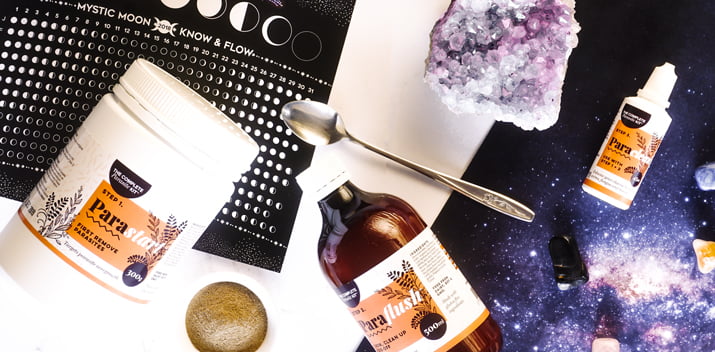Plagued by parasites and at your wits end? You are not alone. Many Probiotic Foods fans are wondering whether The Complete Parasite Kit can manage the hard to treat but common protozoans Blastocystis hominis and Dientamoeba fragilis. Here is a helpful course of action to get you started.
Testing.
Firstly, you need to know from your doctor or health professional trained in treating parasites exactly what type of parasite you many have and the severity of the infestation. This is half the battle as regular stool tests can be unreliable indicators of some types of parasites so bare with us here while we explain.
If your stool test comes back negative it does not mean you don’t have a parasite, especially if you are still have life destroying symptoms. It may be worth spending the money on more in-depth testing with a practitioner. CDSA (complete diagnostic stool analysis) coupled with a test that screens for H. pylori plus a PCR screening (DNA analysis) offered by Nutripath in Australia, can be very helpful.
Weed, feed and seed.
When you have an accurate, positive diagnosis you can start putting into practice a range of inner ecology gardening skills called WEED, SEED and FEED. Be guided by your gut instincts, along with advice from your health professional as to whether you need antibiotics or natural alternatives, a combination of both with a total parasite program like The Complete Parasite Kit (CPK).
How does The Complete Parasite Kit fit in?
We have received feedback from customers and practitioners that our Kit is helpful for many types of worms and other chronic infestations due to its comprehensive three step approach. The CPK targets the different life cycles of parasites using 3 types of products over 2 months with instructions and a questionnaire to monitor progress. Read more here.
We are waiting to hear more from people who are currently using the CPK for common protozoan parasite infections like Blastocystis hominis and Dientamoeba fragilis.
What we DO know is that The Complete Parasite Kit can work on weeding the terrain of the body, the ground that invited the parasites in to start with. Unless you weed, seed and feed and support the body with what it needs then parasites are likely to return.
The CPK contains a blend of cleansing, anti-parasitic herbs and nutrients that can work especially well for worms, bad bacteria and fungal overgrowth. The kit can also be used as a comprehensive detox, something we could all do 1-2 times per year to keep your body nicely weeded.

Weed.
Harmful foods are the biggest destroyer of a healthy, inner garden. Weed out the foods that can encourage growth of harmful bacteria, viruses and fungi including sugar, gluten, dairy, soy, corn, refined, processed carbs and damaged fats and highly sprayed fruits and vegetables and conventionally grown meats. You can do this short term, whilst on the program but once you start feeling so good you won’t want to return to these comfort foods that are also addictive.
At the same time (or once your body is healing from the removal of toxic foods, tap water and other gut irritants like coffee and alcohol) start to use natural weed killers. These are present in CPK like garlic, wormwood, black walnut, cloves, ginger, barberry grapefruit seed extract, pau d’arco, pumpkin seed and olive leaf.
Two other oils, black seed oil (black cumin oil) and oregano oil are powerful antiparasitics and can be used for Blastocystis hominis and Dientamoeba fragilis. Black seed oil has been used by many practitioners because of its ability to dissolve biofilm. Biofilm is a slimy layer of mucous that coats the lining of your gut, nasal passages, teeth and gums—any warm moist surface—and where parasites love to hang out undetected.
Seed.
Once you are well into your chosen treatment protocol, maybe one months in, seed the gut. This means adding beneficial bacteria like Probiotic Foods, digestive enzymes, and restoring stomach acid with betaine HCL if low. Repair inflamed and leaky gut with soothing nutrients and herbs. Many of these herbs are found in the CPK and working alongside a herbalist helps to target which herbs might be most useful to seed and restore your gut.
Feed.
Finally, feed you gut with foods that encourage the growth of beneficial bacteria like starchy and non-starchy vegetables, certain fruits like organic berries, resistant starch (unless you have a problem digesting fructose or have SIBO) found in sweet potatoes and rice and smaller amounts of nuts, seeds and a blend of animal or vegetable protein whichever your body needs most.
Managing Parasites can be a long term process that requires attention to diet replacing beneficial bacteria and healing and building the gut and body back to health using natural alternatives like The Complete Parasite Kit. A colonic hydrotherapist, along with other health professionals who know how to look for and manage parasites can provide invaluable support. Ensure you retest for parasites after your treatment course, whatever protocol you choose and please let us know if you have been successful in eradicating them so we can continue to help others.
Learn more about The Complete Parasite Kit in the short video below.
DISCLAIMER: This blog provides general information and discussion about gut health and related subjects. Whilst every effort is made to present up to date information, the area of gut health and the microbiome are changing constantly. We welcome any comments or suggestions. By reading this blog, you agree not to use this blog as a substitute for medical advice to treat any medical condition in either yourself or others. The author encourages you to consult a health professional before making any health changes, especially any changes related to a specific diagnosis or condition. No information contained in these pages should be relied upon to determine diet, make a medical diagnosis, or determine treatment for a medical condition. The information is not intended to replace a one-on-one relationship with a qualified healthcare professional and is not intended as medical advice. Links to other (third party) websites are provided to you to expand understanding of the subject and are not an endorsement or recommendation by the author for the services, information, opinion or any other content on the site or as an indication of any affiliation, sponsorship or endorsement of such third party websites. Your use of other websites is subject to the terms of use for such sites. By reading this blog, you agree that you are responsible for your own health decisions. NO information contained in this blog should be used to diagnose, treat, prevent or cure any disease or condition.The contents of these blogs are copyright and Probiotic Foods is the acknowledged author.

